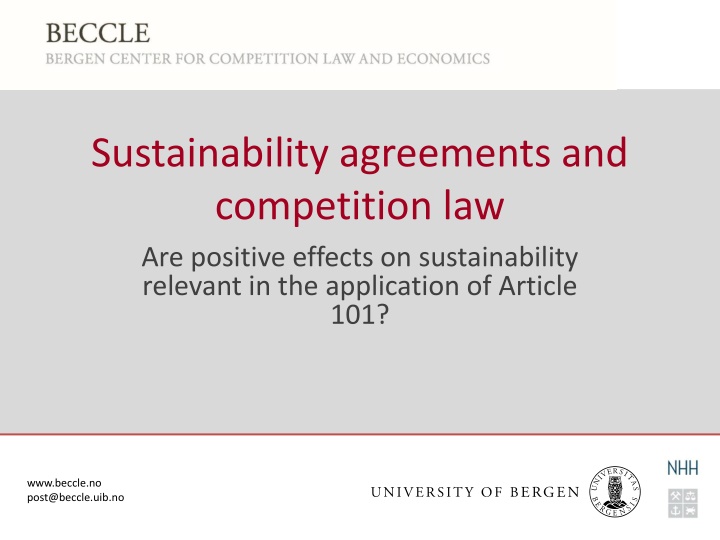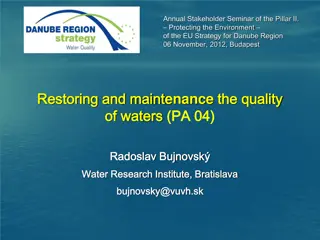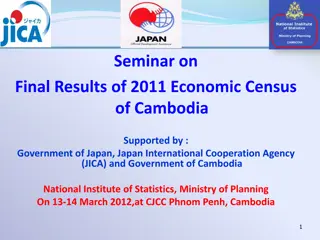
Positive Effects of Sustainability Agreements in Competition Law
Explore the intersection of sustainability agreements and competition law, examining the relevance of positive sustainability impacts under Article 101. Delve into various clarifications, exemptions, and discussions surrounding anti-competitive agreements with sustainability benefits.
Download Presentation

Please find below an Image/Link to download the presentation.
The content on the website is provided AS IS for your information and personal use only. It may not be sold, licensed, or shared on other websites without obtaining consent from the author. If you encounter any issues during the download, it is possible that the publisher has removed the file from their server.
You are allowed to download the files provided on this website for personal or commercial use, subject to the condition that they are used lawfully. All files are the property of their respective owners.
The content on the website is provided AS IS for your information and personal use only. It may not be sold, licensed, or shared on other websites without obtaining consent from the author.
E N D
Presentation Transcript
Sustainability agreements and competition law Are positive effects on sustainability relevant in the application of Article 101? www.beccle.no post@beccle.uib.no
Outline Clarifications Article 101 third paragraph Case law and decisional practice Discussion in the literature What we (don t) know Allowing anti-competitive agreements with positive effects on sustainability in national law
Clarifications Sustainability agreements Cooperation agreements between businesses for the attainment of sustainability goals, such as tackling climate change. For example, businesses may decide to combine expertise to make their products more energy efficient or agree to use packaging material that meets certain standards in order to facilitate package recycling and reduce waste. Exemptions/Justifications Article 101 (3) Wouters-doctrine Ancillary restraints doctrine
Clarifications There are two distinct discussions related to the topic How competition law (and policy) should be Or if we should allow anti competitive agreements which have positive effects on sustainability (or the environment) What is the state of Competition law? Or if competition authorities are allowed to (or even obliged to) take positive effects on sustainability into consideration
Clarifications There are two distinct discussions related to the topic How competition law (and policy) should be Or if we should allow anti competitive agreements which have positive effects on sustainability (or the environment) What is the state of Competition law? Or if competition authorities are allowed to (or even obliged to) take positive effects on sustainability into consideration
Article 101 Prohibits any agreements, concerted practices or decisions by associations of undertakings which have as their object or effect the prevention, restriction or distortion of competition within the internal market If there is no restriction of competition, there is nothing to discuss The interesting cases are those where an agreement is (or may be) anti-competitive and contributing to sustainability
Article 101 Third paragraph Conditions: Agreement must contribute to improving the production or distribution of goods or to promoting technical or economic progress It must allow the consumers a fair share of the benefits (consumer welfare standard) It must not: impose restrictions which are not indispensable to achieving the benefits Eliminate competition on the relevant market
Article 101 Relationship between the first and third paragraph A balancing exercise between negative effects and (static and dynamic) efficiencies If the agreement s net effect on consumer welfare is positive, the agreement is not prohibited
Article 101 third paragraph The third condition restrictions must be necessary (indispensable) to the attainment of the benefit If the efficiency or sustainability goals can be achieved without restricting competition, the agreement is prohibited despite the positive effects The requirement of indispensability is related to whether the undertakings can achieve the benefit/efficiency without restricting competition, or a less severe restriction of competition
Article 101 third paragraph First condition improving the production or distribution of goods or promoting technical or economic progress Only efficiencies on the relevant market? Or are benefits outside of the relevant market (externalities) also relevant? Sustainability agreements may provide both Effects on the market: development of better production methods or higher quality products Effects outside the market: reduced pollution, reduced energy consumption etc.
Article 101 third paragraph Benefits on the relevant market Are more environmentally friendly products better products? How to measure quality? Does improvement of production require cost reductions (static efficiency)? Or may a more sustainable production (without cost reductions) be considered as an improvement of production or distribution of goods? No clear answers in the legal sources
Article 101 third paragraph Are only the effects on the relevant market relevant? Commission s guidelines para 84 Only effects in the relevant market Unless two markets are related CECED (OJ 2000 L187/47) collective environmental benefits were found to be relevant But they were not necessary to exempt the agreement Case C-382/12 P, Mastercard Claims in the literature (Gassler 2021) that this judgment shows that efficiencies outside of the relevant market are relevant But the judgment only shows that efficiencies in the merchant part of a two- sided market are relevant. Cannot be used as an argument in favor of benefits outside of the relevant market being relevant in general. Effects outside the relevant market does not appear to be able to justify a restriction
Article 101 third paragraph Are externalities or non-economic benefits relevant under Article 101 third paragraph? Commission s decisional practice Several Commission decisions under the previous notification procedure which considers positive effects on environment, employment and culture, as relevant under Article 101 third paragraph CECED (OJ 2000 L187/47) Commission s guidelines Only mentions classic economic efficiencies Case law Case T-528/93, M tropole T l vision, para 118: Admittedly, in the context of an overall assessment, the Commission is entitled to base itself on considerations connected with the pursuit of the public interest in order to grant exemption under Article 85(3) of the Treaty. case 26/76, Metro I, para 43 Employment benefits No clear guidance from the judgments of the ECJ
Discussion in the literature Division of competence and democratic legitimacy Who should balance competition (economic efficiency) and sustainability? Odudu (2006) Market failure or governmental failure? Competition law as a mean to correct governmental failure? Townley (2009) Legal Certainty Operational rule
Conclusions There is some support in case law and decisional practice for taking externalities (non-economic benefits) into consideration under article 101 third paragraph But we don t know if such effects may justify a restriction of competition on its own And we don t know how to balance such effects against the negative effect on competition or consumer welfare And we don t know(?) how to value sustainability as a quality improvement in relation to dynamic efficiency
Commissions draft guidelines Agreements which don t affect competition are lawful Sustainability standardization agreements Agreeing to phase out non-sustainable products, harmonizing packaging materials, use sustainable inputs etc. Still prohibited if they amount to an object restriction Agreements on how to translate increased costs to increased prices, or pressuring undertakings to refrain from marketing non-sustainable products Not clear when the Commission will consider such agreements as object restrictions Introducing a safe harbour for non-object restrictions Transparent procedures Voluntary participation Standards cannot impose maximum standards No exchange of information not necessary for development of standards Standards must not lead to significant price increase or reduction of choice Article 101 (3) Still required that the consumers on the relevant market receive a fair share Is this in line with case law? Apart from the standardization agreements safe harbour, is there any increase in legal certainty here?
National competition law what can member states do? If an agreement has an effect on trade between Member States, Article 101 is applicable in addition to national competition law provisions If an agreement is exempted from national competition law based on sustainability benefits, it may then still be prohibited by Article 101 Member States cannot exempt agreements from Article 101






















